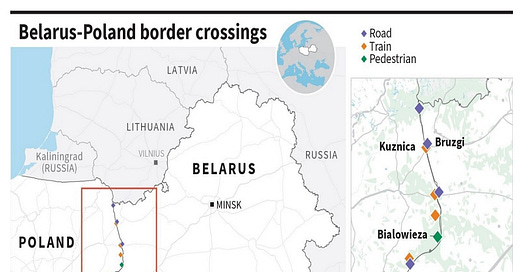This could worsen Poland’s ties with Western Europe in parallel with cutting it off from this lucrative route upon which Chinese-EU overland trade is dependent.
Polish Foreign Minister Radek Sikorski revealed late last month that his country was considering closing its border with Belarus, which its Western-backed and Lithuanian-based “opposition” leader Svetlana Tikhanovskaya criticized him for on the basis that it would destroy the West’s soft power. There’s been no news about this since, thus prompting publicly financed Belarusian media BelTA to publish a piece on this subject earlier in the week titled “The play is over? How border games played out for Poland”.
It divided Poland’s ploy into three phases: the buffer zone and consequences; Duda’s Chinese voyage; and the blockade at Malaszewice. The first concerned the liberal-globalist government’s restoration of its conservative-nationalist predecessor’s policy, which hit local border economies very hard, while the second described the futility of the Polish President’s efforts to get China to pressure Belarus on the illegal immigrant issue. It’s the third of these phases where BelTA makes the best point.
According to them, President Xi’s announcement alongside his Kazakh counterpart on 3 July that China will launch freight transportation to Europe along the Trans-Caspian (“Middle Corridor”) route can be interpreted as a stinging rebuke of the Polish leader’s recent efforts to turn him against Belarus. Malszewice is correctly described in the text as “China’s gateway to Europe” and it’s through here where the bulk of China’s overland exports to Europe pass.
Although that dry point remains important, BelTA interpreted China’s abovementioned move as signaling that it has alternatives for maintaining trade with the EU in the event that Poland indefinitely shuts down that crossing, which was coincidentally disrupted for 33 hours on the same day as Xi’s announcement. One of the experts whose assessments they cited in their piece also noted that China could get France and Germany to pressure Poland to lift any potential blockade in order to restore access.
It would therefore be maximally detrimental to Poland to flirt with any more border closures since this could worsen its ties with Western Europe in parallel with cutting Poland off from this lucrative route upon which Chinese-EU overland trade is dependent. Belarus wouldn’t be all that adversely affected, their experts predicted, since non-Western companies are already replacing Poland’s pre-sanctions role in that country’s markets. The only one who’d be dealt a powerful blow would be Poland.
It's perhaps with these observations in mind, which France and/or Germany might have reminded Poland of during the recent Weimar Triangle meeting, that Poland has remained silent on this front. Simply put, its leadership might have realized how counterproductive it would be to close the border with Belarus, which wouldn’t have any significant effect on stopping illegal immigrant invaders. Only more robust border security and cooperation with Belarus can help curb these flows.
The first is already in progress while the second remains an impossibility so long as Poland continues imposing sanctions against Belarus and hosting anti-government militants that still threaten it. This policy isn’t expected to change since Poland considers itself to be NATO’s vanguard against Russia and Belarus. It’s also presenting itself as a semi-autonomous pole of regional influence through its latest powerplay in Ukraine, which it plans to turn into a client state through their new security pact.
Nevertheless, for as regionally disruptive as these policies are, they could be even more counterproductive for the average Pole if Warsaw closed the border with Belarus and thus deprived their economy of its competitive advantage in serving as a middleman for Chinese-EU trade. That policy still remains on the table in theory, but policymakers’ conspicuous silence in recent weeks suggests that they’re reconsidering its wisdom, which might have to do with Poland finally realize what it would lose.





If anyone was ever looking for an example of deranged, self-lacerating foreign policy there is no need to look any further than Poland's attitude to Bielarus. President Lukaszenko is a stateman who cares for his people and his country in contrast to Poland's muppet show which passes for policy.
Re: "Poland Shouldn’t Close the Border with Belarus. Detrimental Impact of China Trade with Western Europe"...
Andrew - Here is my worry... Have you ever look at the matter of Anglo-american corporations that moved to China from the West, (US, Canada) to lower cost of production... Are the products imported from China to Europe - Chinese products, or are they corporate transnational products of the West and America, produced in China ? It seems like nobody want to talk about this issue...